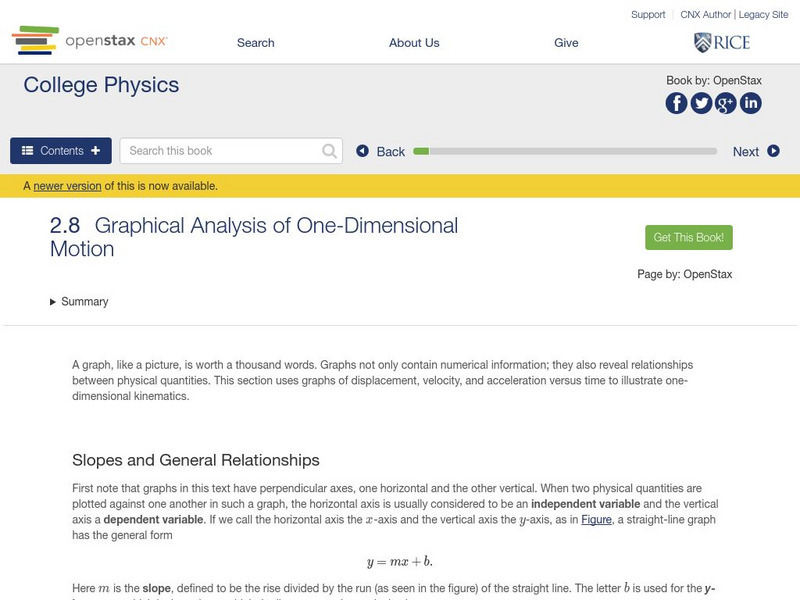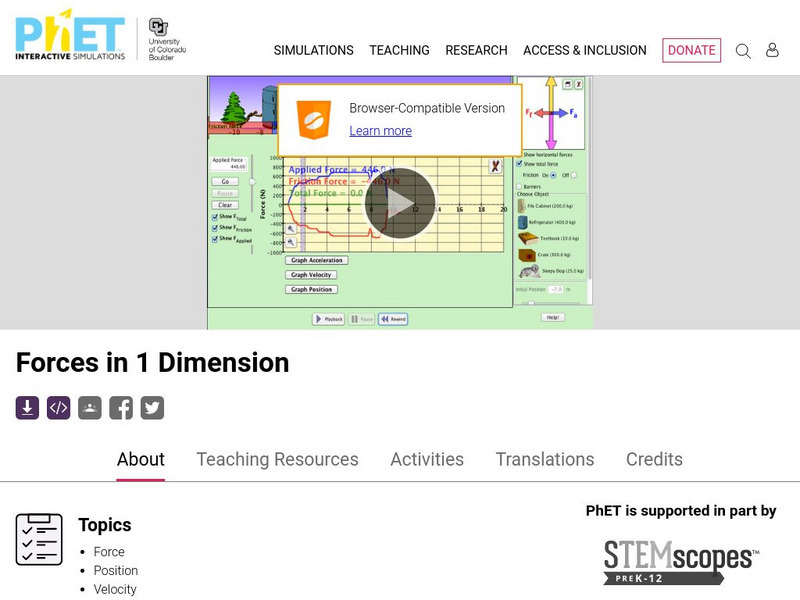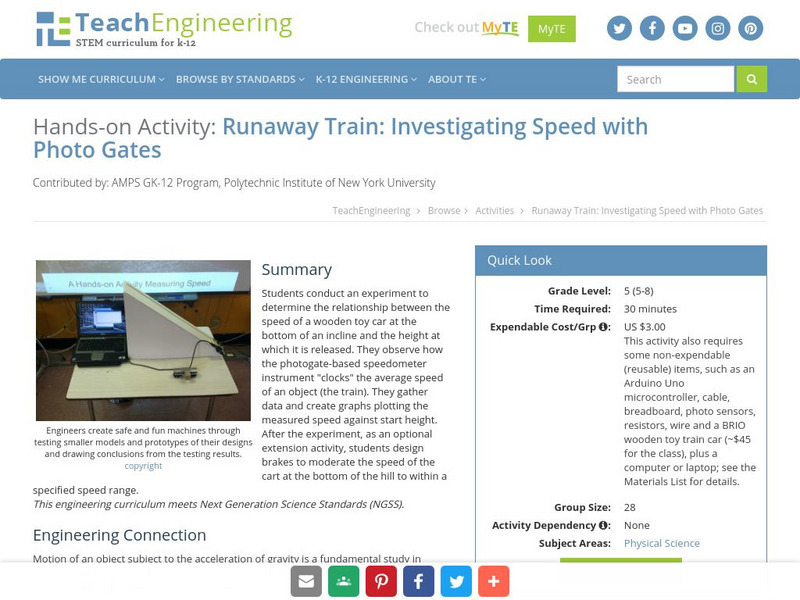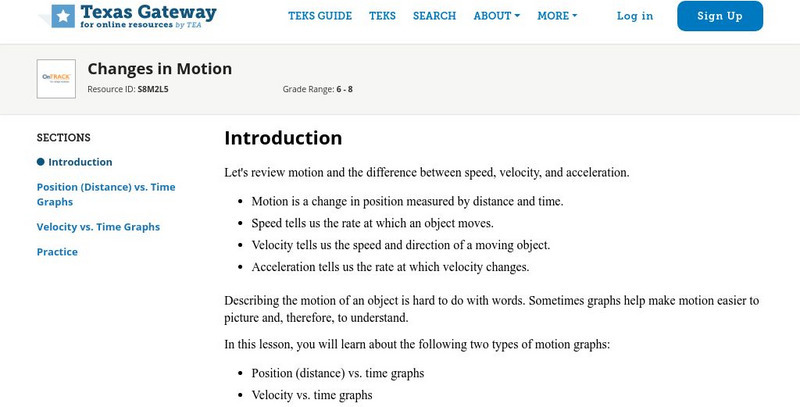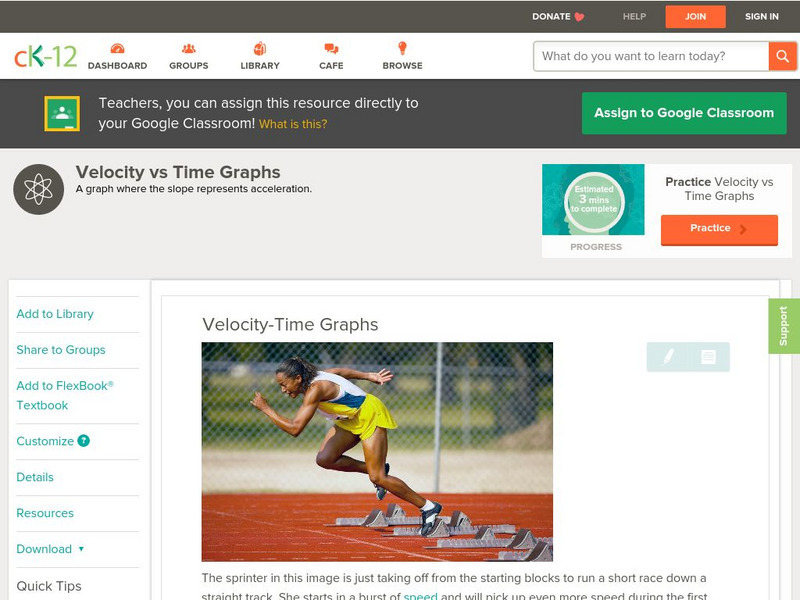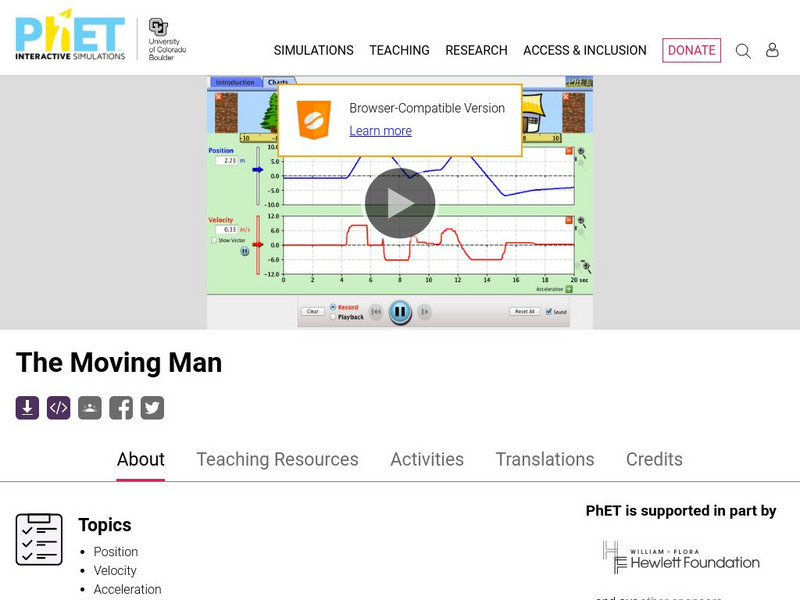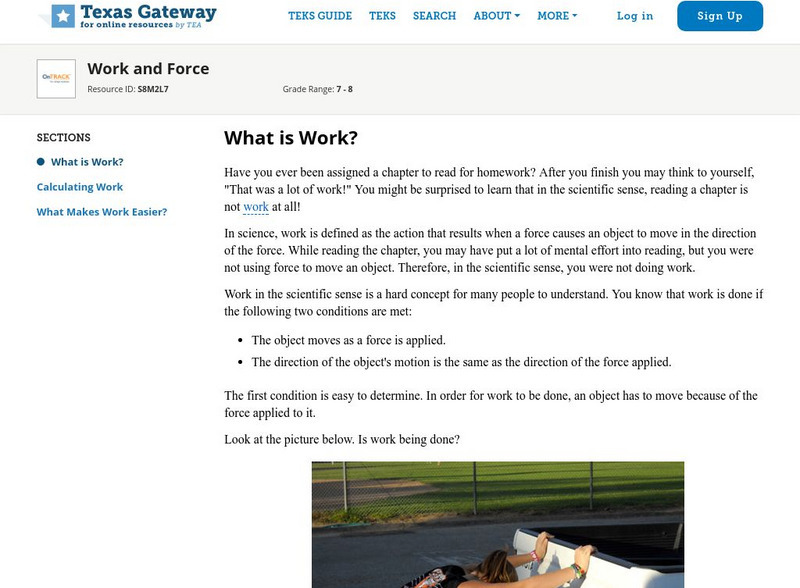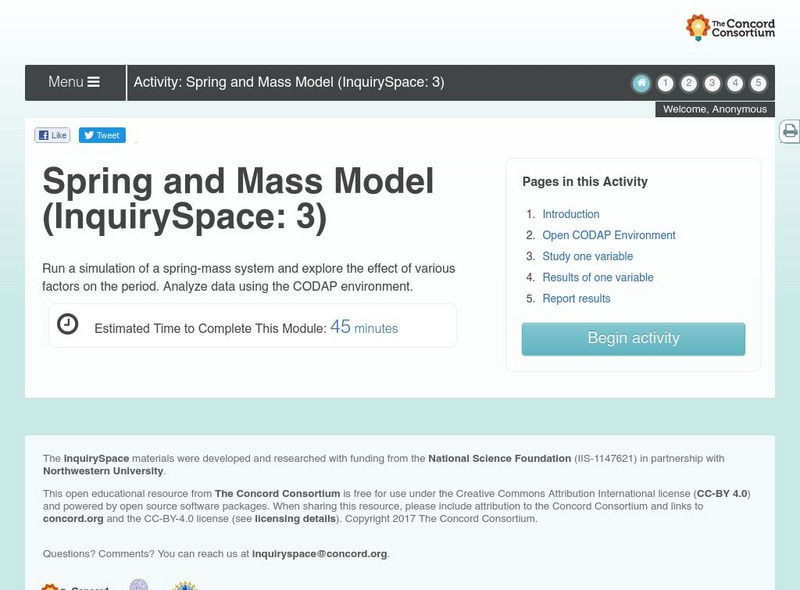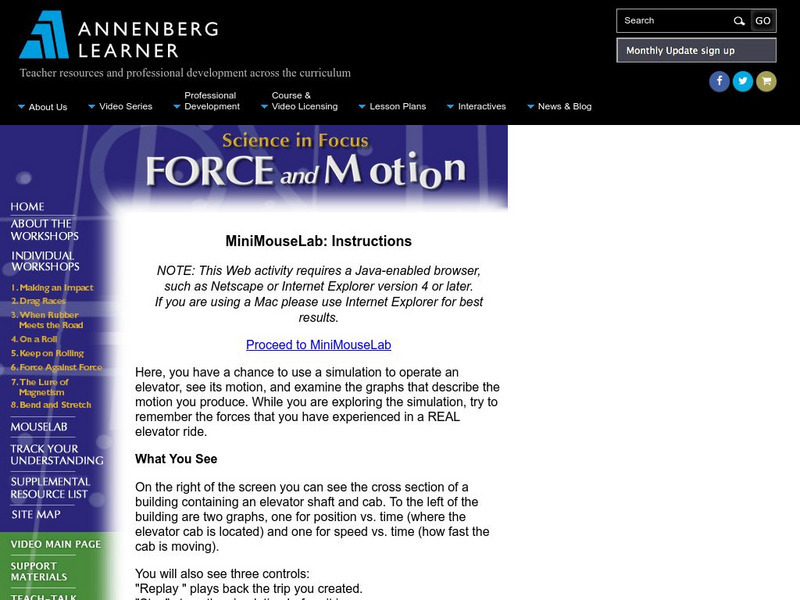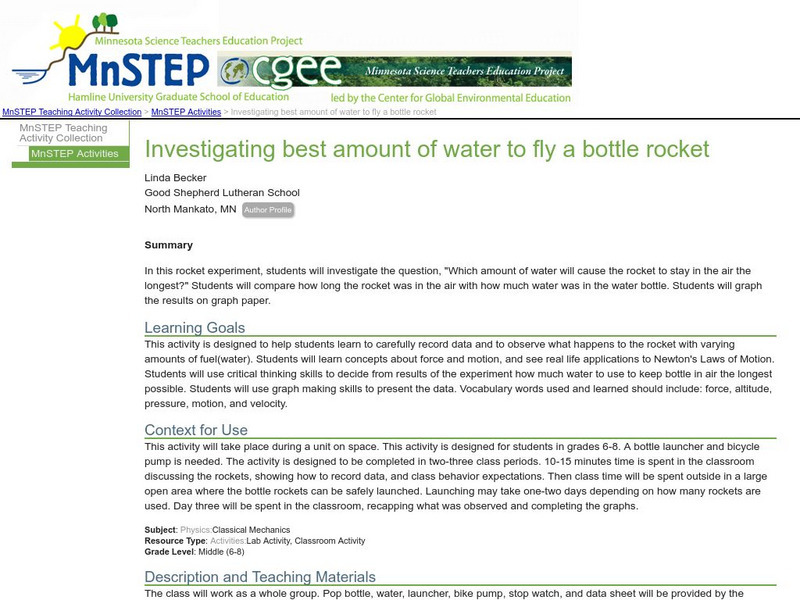Hi, what do you want to do?
CK-12 Foundation
Ck 12: Physics: Motion Study Guide
This study guide on motion covers some key vocabulary and terms to describe motion: displacement vs. distance, acceleration, speed vs. velocity, and instantaneous vs. average. It includes graphs showing distance vs. time, velocity vs....
CK-12 Foundation
Ck 12: Episd: Velocity Time Graphs
[Free Registration/Login may be required to access all resource tools.] Break down graphs illustrating velocity and time to understand motion.
OpenStax
Open Stax: Graphical Analysis of One Dimensional Motion
In the following interactive module students will describe a straight-line graph in terms of its slope and y-intercept. They will determine average velocity or instantaneous velocity from a graph of position vs. time.
University of Colorado
University of Colorado: Ph Et Interactive Simulations: Forces in One Dimension
Use this simulation to see the results of applying a force to move an object. Analyze forces and friction using graphs.
TeachEngineering
Teach Engineering: Runaway Train: Investigating Speed With Photo Gates
Students conduct an experiment to determine the relationship between the speed of a wooden toy car at the bottom of an incline and the height at which it is released. They observe how the photogate-based speedometer instrument "clocks"...
BioEd Online
Bio Ed Online: Balloon Blast
In the following lesson plan students are asked to devise a plan to measure the distance of a balloon's flight, predict the direction a balloon will travel as it deflates, learn about Newton's Laws of Motion, experience Newton's Third...
CK-12 Foundation
Ck 12 Exploration Series: Simulations: Physics: Butterfly Stroke
[Free Registration/Login Required] Learn about the relationship between velocity and position for a swimmer. Adjust the velocity of the legs, streamline, and arms to experiment with the slope of velocity in the simulation swimmer. Dig a...
CK-12 Foundation
Ck 12: Episd: Position Time Graphs
[Free Registration/Login may be required to access all resource tools.] Understand how to evaluate data presented in graphs based on speed and velocity calculations.
Texas Education Agency
Texas Gateway: Changes in Motion
In this lesson, you will learn about position vs. time graphs and velocity vs. time graphs and how to use them to solve problems.
CK-12 Foundation
Ck 12: Physical Science: Velocity Time Graphs
[Free Registration/Login may be required to access all resource tools.] How to draw a velocity-time graph and what it represents.
Texas Instruments
Texas Instruments: Graphing Motion
This activity assesses students' knowledge and understanding of graphing motion.
University of Colorado
University of Colorado: Ph Et Interactive Simulations: The Moving Man
Learn about position, velocity, and acceleration graphs. Move the little man back and forth with the mouse and plot his motion, and then set the position, velocity, or acceleration and let the simulation move the man for you.
CK-12 Foundation
Ck 12: Physical Science: Position Time Graphs
[Free Registration/Login may be required to access all resource tools.] How motion and speed can be represented by a distance-time graph and how average speed can be calculated from it.
Texas Education Agency
Texas Gateway: Work and Force
Given descriptions, illustrations, graphs, or charts, students will contrast situations where work is done with different amounts of force to situations where no work is done, such as moving a box with a ramp and without a ramp or...
Concord Consortium
Concord Consortium: Spring and Mass Model
An interactive tool where students can explore how a spring behaves, and how changing the elasticity, mass, push/pull force, and friction affect its motion or period. As the spring moves, its motion is shown on a distance-time graph.
CK-12 Foundation
Ck 12 Exploration Series: Simulations: Physics: Model Rocket
[Free Registration/Login Required] Learn about the relationship between position and velocity for a model rocket during launch and in free-fall. Experiment with rocket mass, rocket thrust, and rocket burn time to understand the...
Concord Consortium
Concord Consortium: Stem Resources: Motion on a Ramp
Using a motion detector, students produce graphs that show the motion of a toy car as it moves on a ramp. Students collect distance versus time graphs and velocity versus time graphs as well as predict what the motion will look like on...
Annenberg Foundation
Annenberg Learner: Mini Mouse Lab
Use a simulation to operate an elevator and see its motion. Examine the graphs that describe the motion you produce.
Texas Instruments
Texas Instruments: Classroom Activities: Parachuting
This activity explores a parachutist and her position, velocity and acceleration. Graphing and calculating these functions will be required.
CK-12 Foundation
Ck 12 Exploration Series: Simulations: Physics: Driverless Car
[Free Registration/Login Required] Learn about adding two vectors together by components in the context of a GPS-style city map. Adjust magnitude and angles in the two vectors to simulate the driverless car. Examples taking this concept...
Science Education Resource Center at Carleton College
Serc: Investigating Best Amount of Water to Fly a Bottle Rocket
In this rocket experiment, young scholars will investigate the question, "Which amount of water will cause the rocket to stay in the air the longest?" Students will compare how long the rocket was in the air with how much water was in...
Physics Classroom
The Physics Classroom: Circular and Satellite Motion: Roller Coaster Model
An interactive playground for students to explore the physics of roller coasters. Learners investigate by changing the variables of force, velocity, friction, and vectors. Energy bar charts are displayed as the coaster car moves along...
Science Education Resource Center at Carleton College
Serc: Newton's Second Law: How Does Acceleration Change With Varying Forces?
In this lab activity, students investigate the effects of changing force on the acceleration of a lab cart testing Newton's Second Law of Motion. They will use distance and time to calculate velocity and create a graph representing their...
CK-12 Foundation
Ck 12: Plix Series: Newton's First and Second Laws
[Free Registration/Login Required] Read a force scenario, and then analyze the graphs provided to gain an understanding of inertia and force. After the activity, answer three challenge questions to check for understanding.







